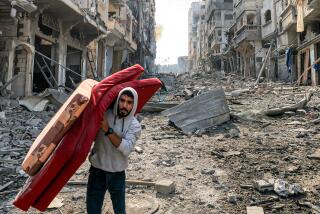What We Need Is a New Road Map to Peace -- in Iraq
President Bush insists that the United States stay the course in Iraq, when whatâs needed is a course correction. The summoning of L. Paul Bremer III, the U.S. administrator for Iraq, to the White House on Tuesday conveys a sense of urgency. The administration needs a new and more viable plan to accelerate Iraqi sovereignty.
The administration must broaden Iraqâs Governing Council into an interim assembly, reverse the decision to disband the Iraqi army and create a United Nations trust fund to internationalize the reconstruction.
When the Governing Council was established in July, it was hailed as a major step toward empowering Iraqis with responsibility for running their country. The council designated Iraqis to head each of Iraqâs new ministries.
Since then, the council has become increasingly dysfunctional. Council members bicker constantly and most do not show up for meetings. Relations with Bremer have gone from bad to worse. Itâs unlikely the council will meet the U.N. deadline of mid-December for creating a timetable for a constitution.
Whatâs needed is a more legitimate and democratically elected body -- an interim assembly. To broaden the circle without taking on the cumbersome task of dismantling the council, the assembly would add cabinet ministers. To ensure geographic representation, local political and tribal leaders would select delegates from each of Iraqâs 18 provinces.
Once established, the assembly would assign a commission to prepare Iraqâs new constitution. With nationwide town hall meetings providing a forum for grass-roots participation in debating and modifying the constitution, the process would enable the Iraqi people to have ownership of the outcome.
However, nation-building cannot occur when there is a war going on. Even the best-laid plans will fail when the violence and insecurity pervade. Other nations have declined to send significant forces because there is no peace to keep.
Though efforts to create a new Iraqi army and police force make good sense, Washingtonâs overly accelerated program pushing raw Iraqi recruits onto the front lines does not. Iraqi police have become cannon fodder for the anti-American resistance. Disbanding the 400,000-man Iraqi army was a huge mistake. The edict infuriated many members of the armed forces who, instead of becoming partners in providing security, have taken up arms against the coalition.
It is not too late to reverse the decision. Bremer should work with former brigade-level commanders to reconstitute the army into a temporary constabulary force. The constabulary would be placed under coalition control and used to enhance intelligence gathering and assist with tasks such as border security and site protection.
Greater cooperation with local militias, such as the peshmerga in Iraqi Kurdistan, also would lighten the load of coalition forces and allow them to concentrate efforts in hostile areas, such as the Sunni Triangle. Other countries would be more willing to deploy troops, perhaps under NATO auspices, once the security situation got under control.
In bringing back vetted elements of the Iraqi army, the U.S.-led Coalition Provisional Authority must be careful that former members of Saddam Husseinâs intelligence service, the Mukhabarat, do not slip through the screen. Nor should military officers who led the genocidal campaigns against Kurds and Shiites be allowed to serve in the new Iraq. The authority should work with Iraqis to prepare a âmost wantedâ list, set up a panel to investigate war crimes and create a military council to professionalize the armed forces.
Establishing security and building democracy is a long process. Although the coalition deserves credit for progress in providing water and electricity and restoring services, Iraqi resentment of foreign occupation is growing daily. Internationalizing reconstruction is the only way the United States can legitimize its long-term presence in Iraq.
To this end, the World Bank/U.N. committee established to monitor contributions from the international community should be upgraded into a full-fledged U.N. trust fund. The U.S. could demonstrate its commitment to internationalizing reconstruction by designating a portion of the recent supplemental appropriation to match contributions from other countries at the October donorsâ conference in Madrid. The trust fund would focus on development and job creation, while the U.S. Agency for International Development would continue its primary role contracting major reconstruction and infrastructure rehabilitation.
It is disingenuous for the Bush administration to say that the growing number of attacks against coalition forces is a measure of progress. It needs to adopt a new approach and a different attitude of cooperation with Iraqis as well as the international community. Resistance will grow until Iraqis see a credible process for restoring Iraqâs sovereignty.
More to Read
Get the L.A. Times Politics newsletter
Deeply reported insights into legislation, politics and policy from Sacramento, Washington and beyond. In your inbox three times per week.
You may occasionally receive promotional content from the Los Angeles Times.










